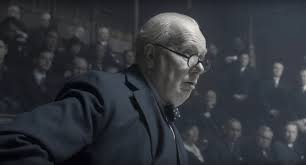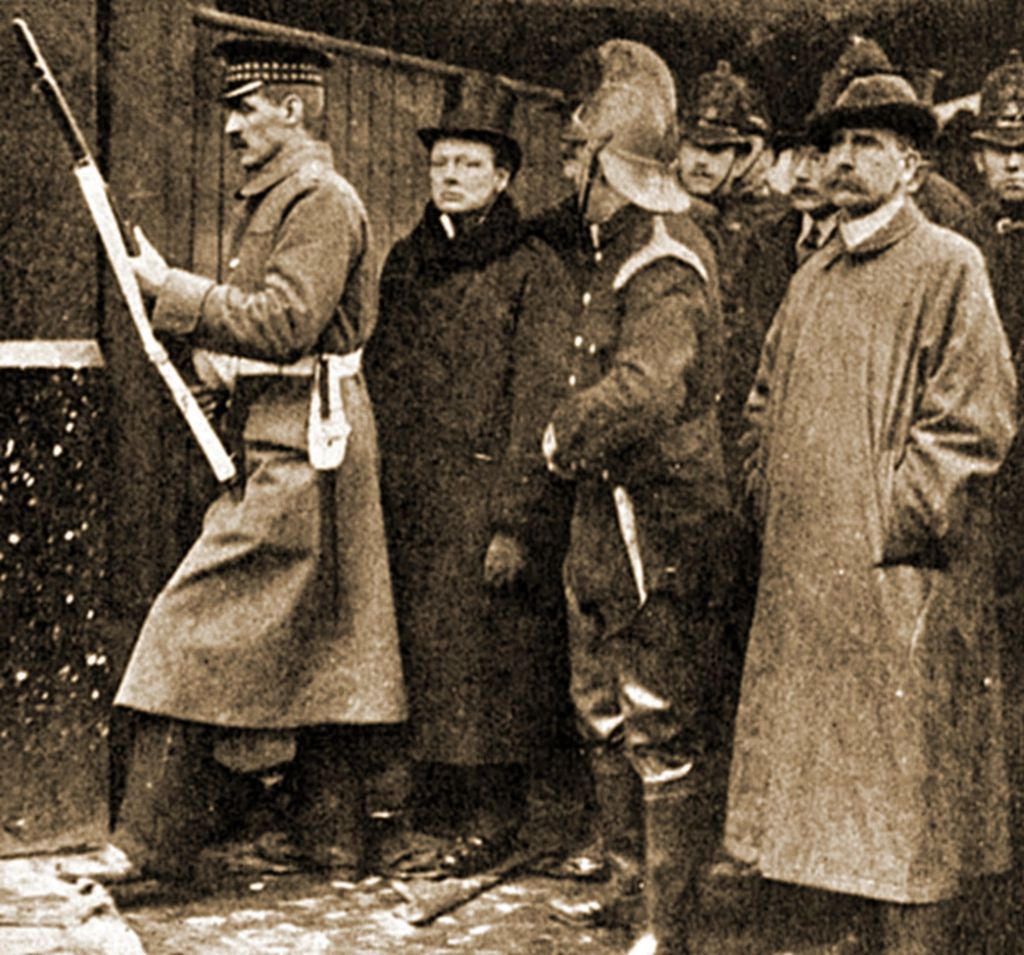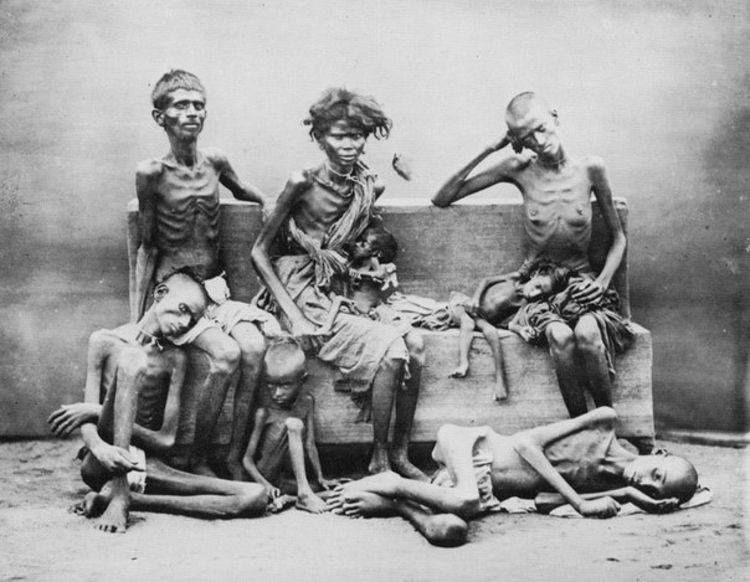
"The wonderful
thing is that 3/4 of the population of the world imagine
that Churchill is one of the Strategists of History, a
second Marlborough, and the other 1/4 have no idea what a
public menace he is and has been throughout this war! It is
far better that the world should never know, and never
suspect the feet of clay of this otherwise superhuman being.
Without him England was lost for a certainty, with him
England has been on the verge of disaster time and again ...
Never have I admired and despised a man simultaneously to
the same extent. Never have such opposite extremes been
combined in the same human being." - diary entry by Field
Marshal Alanbrooke, Chief of the Imperial General Staff, for
10 September 1944.
On the eve of England's contorted efforts to negotiate its ignominious retreat from Europe and the chaotic spectacle of the Tory party ratifying its undignified departure from a union originally designed to prevent another World War, there has been a renewed appetite for movies about 1940. After Brian Cox burnished Winston Churchill's reputation and Christopher Nolan blasted audiences away with his operatic Dunkirk, Joe Wright (who previously staged his own bravura evacuation scenes in Atonement) has released yet another version of England’s Darkest Hour, when the amphetamine-fueled Nazi forces gathered across the Channel, literally twitching to invade Britain's green and pleasant land.
Such patriotically aggrandizing movies have effectively rehabilitated Churchill's standing in the national conscience, despite the dyspeptic, alcoholic, and disgraced First Lord of the Admiralty's deplorable handling of the Gallipoli campaign. Wright relegates to an end title the circumstances in which the war time PM was soundly defeated by an overwhelming majority of dissatisfied voters in the 1945 election. He also ignores the unpleasant fact that Churchill, in order to ensure his victory over Hitler, entered into a unholy alliance with Stalin and Roosevelt and placed the nation in the grip of crippling debts from which it never fully recovered.
Shot mostly in a subterranean gloom, as befits its title, Darkest Hour obscures such inconvenient truths by situating the main action during a single month, starting in May 1940. The result is less an accurate record of the impending global conflict than a high-octane political thriller with Churchill battling a cabal of scurrilous politicians determined to undercut his authority - Tinker, Tailor meets House Of Cards. It suggests that Churchill's immediate enemies were not so much Hitler and Mussolini, but Neville Chamberlain (Ronald Pickup) and Viscount Halifax (Stephen Dillane), both of whom try to undermine his cabinet and parliamentary position by scheming for a deal with Hitler behind his back. Also thrown into the mix is Ben Mendelsohn's superb George VI, another fan of appeasement at first, though the film includes a key scene in which he stiffens up the prime minister's intestinal fortitude. At least Darkest Hour does not follow The King’s Speech in implying that Winnie sided with Bertie during the Abdication, but collectively the three of them share sufficient speech impediments to make a total mockery of 'received pronunciation.'
A plethora of factual errors remain, however, marring any claim to historical authenticity that Wright might try to make for his movie. He skips over the Labour Party's role in Churchill becoming PM, since Clement Attlee was perfectly prepared to serve in a coalition government led by Halifax. The line that Churchill "mobilized the English language and sent it into battle" is misattributed to Halifax - in reality, Edmund R Murrow originated the phrase in 1954, which was subsequently adopted by President Kennedy when Churchill was awarded honorary US citizenship in 1963. Like Cox' Churchill, Darkest Hour also invents an attractive young ingénue as his stenographer (Lily James), with whom he gets to be first irascible, then tired and emotional. No mention is made of the fact that it was Hitler's disastrous tactical decision to delay his assault on Dunkirk that enabled all the little boats to bring most of the boys home safely. The movie's end titles neglect to mention that, while Churchill lost the 1945 election, he was re-elected in 1951, an ineffectual and ailing man.
Despite such inaccuracies and oversights, Wright's movie manages to pack an effective dramatic punch, mostly due to its ambitious scale, narrative propulsion, and some superb performances. Dillane plays Halifax with impassive mandarin malignity, while the always beguiling Kristin Scott Thomas does equally well as Churchill's wife, appearing both exasperated and affectionate as she helps the impossible old devil get dressed. But it is Oldman's star turn that most impresses, cocooned in his heavy latex/Homburg/bowtie/cigar/padding combo. Bunkered down in the Cabinet War Rooms and yelling at his long-suffering staff for much of the action, Oldman captures with uncanny precision Churchill's jowl-quivering voish and weird cadencesh. When he finally agrees to inform Mussolini that Britain might be interested in the Danegeld-price (how much for Hitler to hold back?), Oldman lapses into a kind of anaphylactic shock. He also convincingly conveys the infantile nature of Churchill's oddly unlined resting face, his sly and manipulative good humour, and his numbed inertia when overwhelmed by the Black Dog of drunken depression. Just before the pivotal scene in which Churchill receives the King's suggestion that he take the pulse of the proletariat, we see him slumped down in an almost unfurnished room, illuminated by a single bare bulb which literally lights up above his head like the morbid subject of a Lucian Freud canvas - George Smiley channeling Sid Vicious in the Chelsea Hotel.
The screenplay, written by Kiwi Anthony McCarten (who also penned the recent Stephen Hawking biopic The Theory of Everything), is entirely pedestrian, providing plenty of predictable, jingoistic hokum. The absurd suggestion that Winnie would have abandoned his official car and take to the tube in search of a light, recite a bombastic verse from Tennyson to the common man, and have it reciprocated by a curiously educated negro would be risible if it were not so ludicrously moving. Once underground again, he chats up a sentimental cross-section of forelock-tugging subjects and learns the reassuring lesson that his personal convictions are totally in tune with the mood of the common man. It is not yet too late for a more accurate and sceptical movie about the mythology embalming Churchill, one which explores his true role during the Tonypandy Riots and the Siege Of Sidney Street, for instance, or why he hated Adolf Hitler for much the same reason he abhorred Mahatma Gandhi - both were sworn enemies of the British Empire.

Churchill Observing the Siege of Sidney Street, 1911
How to teach the history
of that Empire has been a controversial subject in British
schools for over half a century. By the 1950s, an
educational approach that stressed glorious conquest and the
benefits of imperial rule was no longer tenable. What had
been bloodily won was being rapidly lost, usually
peacefully, but often not. The specter of national decline
is an unpleasant theme in any classroom, but to what extent
avoidance of the subject has to do with realistic attitudes
is hard to calculate. According to a YouGov poll conducted
around the time of the Rhodes Must Fall protests two years
ago, 43% of the population still believed the British Empire
was a good thing and only 19% a bad thing, with 25%
suspecting it was neither. Additionally, 44% felt that
Britain’s history of colonialism was something to be proud
of, while 19% considered it regrettable. As for the statue
of Cecil Rhodes at Oriel College, Oxford, only 11% thought
it should be removed.
Such figures belie the recent campaign by Nigel Biggar, Oxford’s regius professor of moral and pastoral theology and canon of Christ Church, to “moderate our post-imperial guilt." Biggar’s real targets are not those people who feel guilty, so much as those he considers advocates of guilt - “the strident anti-colonialists [who] tell us … that our imperial past was one long, unbroken litany of oppression, exploitation and self-deception." Hostility towards Biggar's attitude has been growing ever since the Times published a piece written by him in casuitical support of political scientist Bruce Gilley (the publication of whose article "The Case for Colonialism" in Third World Quarterly caused almost half of its editorial board to quit in protest) and headlined 'Don't feel guilty about our colonial history.'
Biggar's immediate critics were Oxford’s anti-colonial student group, Common Ground. Fifty-eight Oxford scholars who work on imperial and colonial history then expressed their opposition, after which the protest spread to almost every institution where imperial history is studied, with another open letter, organised by an academic association called Scholars of Empire, attracting roughly one hundred signatures. A few rogue scholars have defended Biggar, but perhaps predictably the most encouraging noises have emerged from chauvinistic letters and opinion pieces in the Times, Telegraph, and Daily Mail.
The disquiet of Biggar's detractors was further augmented by an academic project that Biggar initiated called 'Ethics and Empire,' which its website said would scrutinise the proposition, common to “most reaches of academic discourse,” that “imperialism is wicked; and empire is therefore unethical.” Run under the auspices of Oxford’s McDonald Centre and endowed by an American foundation called the McDonald Agape, its rubric includes “encouraging distinguished scholars for Christ” and whose main objective is to develop “a nuanced and historically intelligent Christian ethic of empire.” Since then, not only has Oxford historian John Darwin resigned as the project’s co-leader, diminishing its historical authority, but larger questions have also been raised concerning exactly how the benefits of empire should be evaluated in terms of moral behavior and ethical consequences, by what yardstick, and in whose opinion.
Biggar denies he will employ anything as crude as a balance sheet, acknowledging that “most cost-benefit analysis is merely prejudice masquerading as mathematics" and calling instead for “a far more intelligent and sophisticated way of evaluating empire morally.” Nevertheless, his preferred approach is to weigh one thing up against another: the abolition of the slave trade (good), versus the Amritsar massacre (bad); the empire as the only armed resistance to the Nazis in 1940-41 (good), versus the extinction of indigenous Tasmanian people (bad). Gilley displays a similar faith in tabulating balance sheets when he describes how the colonial record might be assessed by measuring “development, security, governance, rights, etc.” against the counterfactual (i.e. what would likely have happened in the absence of colonial rule). Such moral arithmetic is specious inanity. Every historical fact, supposing it can even be agreed upon in the first place, has a thousand human ramifications. And history, as every sixth-former knows, is almost always written by the victors, rarely the victims.
Until relatively recently, the ultimate chronicler of the British Empire was Winston Churchill himself, primarily but (by no means exclusively) in A History of The English-Speaking Peoples. Defending Cecil Rhodes in a speech at the Oxford Union two years ago, Biggar said: “If Rhodes must fall, so must Churchill, whose views on empire and race were much the same.” In fact, they were even worse. Churchill had a visceral loathing of Indians. Hindus, he said to his private secretary in 1945, were a foul race “protected by their mere pullulation from the doom that is their due." Despite such virulently racist sentiments, Churchill's reputation among the general public remains impressively high: in 2002 he was voted number one in a BBC poll of the 100 Greatest Britons of all Time.
Churchill's outspokenness earned him many enemies throughout his lifetime and his legacy continues to stir intense debate among historians today. According to Allen Packwood, director of the Churchill Archives Centre, he was an "incredibly complex, contradictory, and larger-than-life human being." His outspoken views on race, Judaism, and Islam have been often quoted and strongly criticised. However, historian Richard Tove has observed that in the context of the era, Churchill was not "particularly unique" in harboring strong opinions on the supposed superiority of Caucasians, even if many of his contemporaries did not share them. Although he was an early and ardent supporter of Zionism, he frequently expressed casually antisemitic views commonly held by many members of the British upper classes.
Churchill's reputation as an unbending imperialist was established early in his political career. At the November 1921 cabinet meeting where it was decided to retrocede Weihaiwei to China, he (alone with George Curzon, another uncompromising imperialist) adamantly opposed the proposal. He lamented Britain’s readiness to barter away former territories such as Java and Corfu, no matter how worthless they were considered, asking "Why melt down the capital collected by our forebears to please a lot of pacifists?" He also staunchly opposed labour unions, held Communist agitation responsible for the Labour movement during the 1920s, and supported social reform only in the condescending spirit of Victorian paternalism.
Churchill's attitude towards Indians and policies regarding Britain's rule of the subcontinent have been universally condemned, leaving a large and indelible stain on his legacy. Even historian Walter Reid, who wrote admiringly about his "absolutely crucial role during the Second World War," acknowledged that Churchill "was very wrong in relation to India, where his conduct fell far below his usual level," and noted that his efforts to manipulate the 1935 Government of India Act exacerbated religious and political divisions between Hindus, Muslims, and princely nabobs. Exactly how much Churchill's actions directly contributed to the 1943 Bengal famine remains debatable, but a highly persuasive case has been made by Madhusree Mukerjee in Churchill, the Secret War that his refusal to accept the advice of his Indian administration was instrumental in the death of between two to three million people. This argument sits at the heart of the disturbing new documentary Bengal Shadows - but for every hundred viewers who swallow wholesale the fallacious fictions of Darkest Hour, no more than half a dozen will probably even hear about it. The kind of memories that the mere mention of Churchill's name conjures up for a resident of Midnapore, West Bengal, and another in Bognor Regis, West Sussex, could hardly be more incompatible.

Victims of the Bengal Famine, 1943
Trivia Facts
• Wright dedicated his film to John Hurt, who was originally cast as Neville Chamberlain (ousted as PM while suffering from cancer), and tragically died of cancer himself during shoot.
• Ronald Pickup, who replaced Hurt, previously played Churchill's father in Jennie: Lady Randolph Churchill.
• Oldman spent over 200 hours in makeup undergoing a radical transformation that necessitated 'fattening' his body with prosthetics weighing half his own weight.
• Oldman is the fifth Harry Potter actor to portray Churchill, following Michael Gambon in Churchill's Secret, Timothy Spall in The King's Speech, Brendan Gleeson in Into the Storm, and Robert Hardy in War and Remembrance and Bomber Harris.
• According to Oldman on The Graham Norton Show, the cigar budget for the movie was over £18,000.



 International Writers' Workshop NZ Inc: Ōtepoti Poets Top The Kathleen Grattan Prize For A Sequence Of Poems
International Writers' Workshop NZ Inc: Ōtepoti Poets Top The Kathleen Grattan Prize For A Sequence Of Poems NZ Amateur Sport Association: 22 Amendments Proposed For 2022 Act Lodged On 22 November
NZ Amateur Sport Association: 22 Amendments Proposed For 2022 Act Lodged On 22 November Auckland University of Technology: Reading Helps Children Face A Difficult Future
Auckland University of Technology: Reading Helps Children Face A Difficult Future PATHA: Puberty Blocker Evidence Brief Affirms Aotearoa’s Approach
PATHA: Puberty Blocker Evidence Brief Affirms Aotearoa’s Approach Tataki Auckland Unlimited: Into Ocean & Ice - Unveiling Antarctica's Past And Present
Tataki Auckland Unlimited: Into Ocean & Ice - Unveiling Antarctica's Past And Present Health Coalition Aotearoa: Urgent Action Needed To Address Aotearoa’s Shameful Household Food Insecurity
Health Coalition Aotearoa: Urgent Action Needed To Address Aotearoa’s Shameful Household Food Insecurity